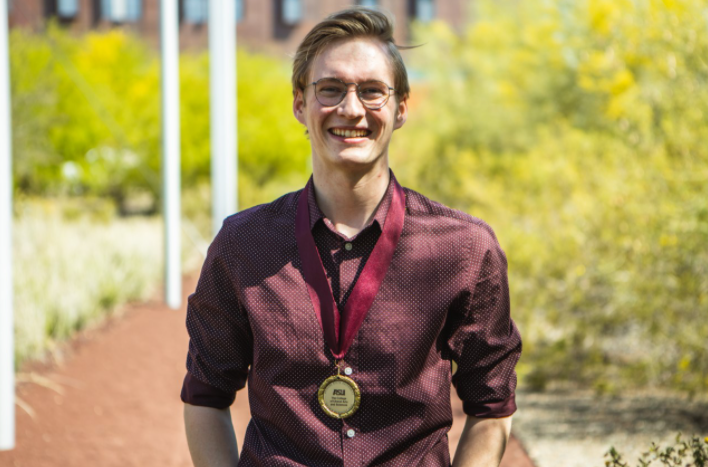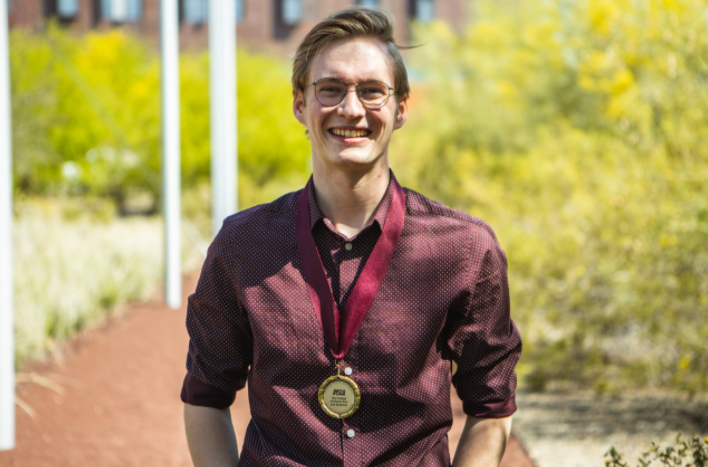History alumnus and Dean’s Medal recipient Joshua Robinaugh moves into the medical field

Joshua Robinaugh was awarded the Dean’s Medal from the School of Historical, Philosophical and Religious Studies when he graduated the spring semester of 2021. While at SHPRS, he was a part of multiple honors societies and had participated in an undergraduate research experience with associate professor of history Hannah Barker.
“Josh has two qualities that make him stand out as one of the most rewarding students I have mentored,” said Barker. “The first is curiosity, he is always asking questions and willing to invest significant effort to follow up on the ones that capture his attention. The second is a willingness to work outside his comfort zone.”
His undergraduate research focused on pre-modern slavery and upon graduating he was hoping to attend an MD program, or a PhD program that focused on the history of medicine and science.
While working as a shift supervisor at Starbucks and as a community assistant at ASU, he realized that as much as he loved being able to reflect on someone’s life from the past, he wanted to be more involved in the lives of people in the present. After taking time to explore his options, he decided the medical field was where he wanted to be.
“It wasn’t my plan, but I ended up meeting people who were actively applying to medical school and the way they described it was incredibly powerful to me and it really resonated with the things that I want out of my career and my life,” said Robinaugh.
Robinaugh began applying for post-baccalaureate premedical programs and enrolled at Johns Hopkins University. The one-year program is designed to prepare students who don’t have a medical background to apply for medical schools.
As someone who came from a strict humanities background, Robinaugh has been asked by people in his life if he wished he had picked a different undergraduate degree, but he says he wouldn’t change his experience.
“For me, I am so glad [history] is what I did because I feel like humanities are so important for people,” said Robinaugh. “Whether they’re a PhD in history or English or if they’re MDs or doctors of osteopathic medicine.”
“I think at this point in my life I am at the best place possible to do what I’m doing now in the most successful way I can. I think, genuinely, my humanities education is something that has affected my life, outside of even my career, in very meaningful ways. I am just grateful for it and I loved what I learned for four years.”
While the fields of medicine and humanities are quite different in practice, some skills have been valuable as Robinaugh has begun conducting research. However, the research is different and poses its own unique challenges.
“It’s not the same,” said Robinaugh. “Not that it’s more or less difficult, it’s just different. Those skills of understanding the process of constructing an argument, the critical thinking, the understanding of how to understand things and justifying everything have helped with the switch.”
Robinaugh is interested in research on patient outcomes based on their environment and positions. Specifically, he is interested in understanding how the world, as it is, affects the outcomes of patients and how providers can best anticipate those things to create the best outcomes for their individual patients. While he is still unsure of his ultimate plans in the medical field, he hopes to continue pursuing these topics in his education and career.
When asked what advice he would give to students making a change from one field to another, Robinaugh says, “[t]here will be roadblocks and bumps and it won’t be smooth sailing, but it’s very possible and if it’s what you want to do, you can do it.”
Written by Rachel Bunning, Communications Specialist at ASU’s School of Historical, Philosophical and Religious Studies

